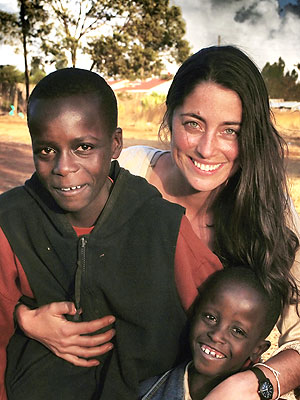Rebecca Welsh Helps Orphans And At-Risk Kids Worldwide
Rebecca Welsh was volunteering in orphanages in Honduras in 2002 when she had an eye-opening encounter with a child living on the streets.
"A 6-year-old little girl stopped me and begged me for water," she says. "She travelled in a pack of about ten children and was the youngest in the group."
She soon found out the children, who couldn't get shelter in the city's overflowing orphanages, slept on cardboard boxes at night and dug through trash to find their next meal.
"I just couldn't believe that was going on and I'd never even heard of it," she says.
That encounter – and her work at the orphanages where she used art to create a bond with the kids – led to her forming the HALO Foundation (Helping Art Liberate Orphans) in 2005.
The nonprofit has raised more than $2 million to buy food, shelter, education, water and clothes for 3,000 kids in 11 orphanages around the world.
"I really want to give these kids a chance to live a normal life," says Welsh, 34, who lives in Kansas City, Mo., "and have food and all their basic needs met because they deserve it."
She auctions off the childrens' artwork to raise money for the foundation; something that started after Welsh got inundated with artwork the orphans sent her as a thank you.
"I thought the best way to share their work was to showcase it," she says, "and raise funds that would go back to the children at the same time."
It worked.
"The average kid's piece now sells for around $500," she says. "That amount provides dinner for an entire orphanage for 50 nights."
The foundation also operates learning centers in two cities in the United States, including Kansas City, to help foster children and other at-risk youth learn life skills and help them heal through art therapy.
"I think anyone who puts time and energy into improving the lives of kids is wonderful," says Sister Berta Sailer, co-founder of Operation Breakthrough, which provides child care and other social services for the working poor in Kansas City.
"I think it's so important the kids everywhere feel valued," says Sailer, who has worked with Welsh's foundation on a few projects in Kansas City, "and have their needs met and activities designed for them."
Kiki, 13, who started coming to Welsh's Kansas City center in 2010 after two years of being homeless, can attest to that.
"It helped me to become a better leader," she says, "and to learn how to talk to people in a better way."
Kiki says her favorite part is Interplay, where kids use dance and song to express their feelings.
"We dance and sing and yell and let out a lot of feelings, like anger," she says. "I feel relaxed and tired afterward."
Welsh says she still gets a thrill when she hears a story like this.
"It makes me feel like my purpose in life is fulfilled," she says. "I know this is what I'm here to do. I feel very blessed."







 Reply With Quote
Reply With Quote
Bookmarks